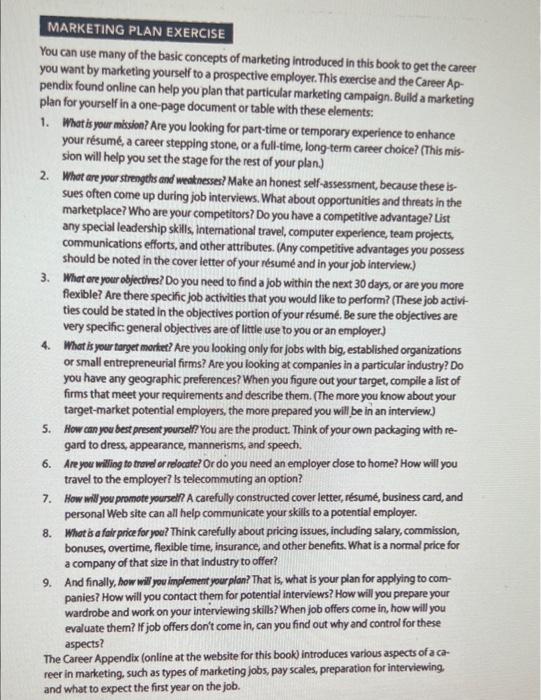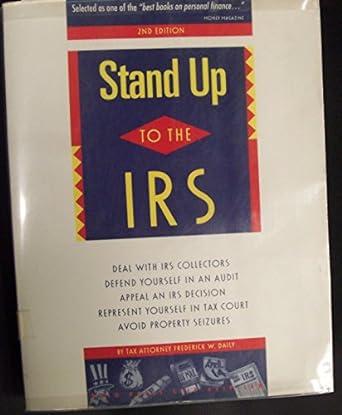Answered step by step
Verified Expert Solution
Question
1 Approved Answer
help MARKETING PLAN EXERCISE You can use many of the basic concepts of marketing introduced in this book to get the carcer you want by
help 
MARKETING PLAN EXERCISE You can use many of the basic concepts of marketing introduced in this book to get the carcer you want by marketing yourself to a prospective employer. This exercise and the Career Appendix found online can help you plan that particular marketing campaign. Build a marketing plan for yourself in a one-page document or table with these elements: 1. What is your mbsion? Are you looking for part-time or temporary experience to enhance your rsum, a career stepping stone, or a full-time, long-term career choice? (This mission will help you set the stage for the rest of your plan.) 2. Whot are your strengths and waknesses? Make an honest self-assessment, because these issues often come up during job interviews. What about opportunities and threats in the marketplace? Who are your competitors? Do you have a competitive advantage? List any special leadership skills, intemational travel, computer experience, team projects. communications efforts, and other attributes. (Any competitive advantages you possess should be noted in the cover letter of your resum and in your job interview.) 3. What ereyour objectives? Do you need to find a job within the next 30 days, or are you more flexible? Are there specific job activities that you would like to perform? (These job activties could be stated in the objectives portion of your rsum. Be sure the objectives are very specific: general objectives are of little use to you or an employer.) 4. What isyour target morite? Are you looking only for jobs with big, established organizations or small entrepreneurial firms? Are you looking at companies in a particular industry? Do you have any geographic preferences? When you figure out your target, compile a list of firms that meet your requirements and describe them. (The more you know about your target-market potential employers, the more prepared you will be in an interview) 5. How can you best present yoursell? You are the product. Think of your own padaging with regard to dress, appearance, mannerisms, and speech. 6. Areyou willing to trovel or robcate? Or do you need an employer dose to home? How will you travel to the employer? is telecommuting an option? 7. How millyou promote yourself? A carefully constructed cover letter, rsum, business card, and personal Web site can all help communicate your skills to a potential employer. 8. Whot is a falr prike for you? Think carefully about pricing issues, including salary, commission, bonuses, overtime, flexible time, insurance, and other benefits. What is a normal price for a company of that size in that industry to offer? 9. And finally, how will you inplement yourplan? That i, what is your plan for applying to companies? How will you contact them for potential interviews? How will you prepare your wardrobe and work on your interviewing skills? When job offers come in, how will you evaluate them? If job offers don't come in, can you find out why and control for these aspects? The Career Appendix (online at the website for this book) introduces various aspects of a career in marketing, such as types of marketing jobs, pay scales, preparation for interviewing. and what to expect the first year on the job. MARKETING PLAN EXERCISE You can use many of the basic concepts of marketing introduced in this book to get the carcer you want by marketing yourself to a prospective employer. This exercise and the Career Appendix found online can help you plan that particular marketing campaign. Build a marketing plan for yourself in a one-page document or table with these elements: 1. What is your mbsion? Are you looking for part-time or temporary experience to enhance your rsum, a career stepping stone, or a full-time, long-term career choice? (This mission will help you set the stage for the rest of your plan.) 2. Whot are your strengths and waknesses? Make an honest self-assessment, because these issues often come up during job interviews. What about opportunities and threats in the marketplace? Who are your competitors? Do you have a competitive advantage? List any special leadership skills, intemational travel, computer experience, team projects. communications efforts, and other attributes. (Any competitive advantages you possess should be noted in the cover letter of your resum and in your job interview.) 3. What ereyour objectives? Do you need to find a job within the next 30 days, or are you more flexible? Are there specific job activities that you would like to perform? (These job activties could be stated in the objectives portion of your rsum. Be sure the objectives are very specific: general objectives are of little use to you or an employer.) 4. What isyour target morite? Are you looking only for jobs with big, established organizations or small entrepreneurial firms? Are you looking at companies in a particular industry? Do you have any geographic preferences? When you figure out your target, compile a list of firms that meet your requirements and describe them. (The more you know about your target-market potential employers, the more prepared you will be in an interview) 5. How can you best present yoursell? You are the product. Think of your own padaging with regard to dress, appearance, mannerisms, and speech. 6. Areyou willing to trovel or robcate? Or do you need an employer dose to home? How will you travel to the employer? is telecommuting an option? 7. How millyou promote yourself? A carefully constructed cover letter, rsum, business card, and personal Web site can all help communicate your skills to a potential employer. 8. Whot is a falr prike for you? Think carefully about pricing issues, including salary, commission, bonuses, overtime, flexible time, insurance, and other benefits. What is a normal price for a company of that size in that industry to offer? 9. And finally, how will you inplement yourplan? That i, what is your plan for applying to companies? How will you contact them for potential interviews? How will you prepare your wardrobe and work on your interviewing skills? When job offers come in, how will you evaluate them? If job offers don't come in, can you find out why and control for these aspects? The Career Appendix (online at the website for this book) introduces various aspects of a career in marketing, such as types of marketing jobs, pay scales, preparation for interviewing. and what to expect the first year on the job 
Step by Step Solution
There are 3 Steps involved in it
Step: 1

Get Instant Access to Expert-Tailored Solutions
See step-by-step solutions with expert insights and AI powered tools for academic success
Step: 2

Step: 3

Ace Your Homework with AI
Get the answers you need in no time with our AI-driven, step-by-step assistance
Get Started


